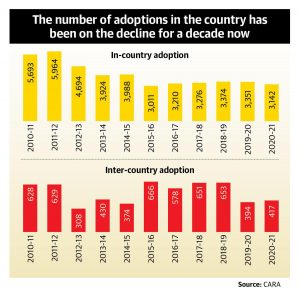ForumIAS announcing GS Foundation Program for UPSC CSE 2025-26 from 27th May. Click Here for more information.
Source: The post is based on the article “Central Adoption Resource Authority (CARA): India’s adoption regulation body” published in “The Hindu” on 16th November 2023
Why in the News?
The Supreme Court has expressed concern over the delay in India’s child adoption process.
What is the Central Adoption Resource Authority(CARA)?

| Specifications | Details |
| Type | Statutory Body |
| Established in | 1990 |
| Nodal Ministry | Ministry of Women & Child Development |
| Parent Act | Juvenile Justice (Care and Protection of Children) Act, 2015 |
| Mandate | To oversee child adoption procedures for Indians and non-resident Indians living abroad. |
| Inter country adoptions | To facilitate inter country adoptions, India has ratified the Hague Convention(1993) in 2003. |
| Laws governing adoption in India | Adoption is governed by two laws in India — the Hindu Adoption and Maintenance Act, 1956 (for Hindus, Jains, Sikhs and Buddhists) and the Juvenile Justice (Care and Protection of Children) Act, 2015. CARA plays a role in the adoption under the Juvenile Justice Act. |
| Recent amendments in adoption process | 1) 2015: Setting up an e-governance system called CARINGS to facilitate adoption. It also allows prospective parents to track applications and set out times for domestic and inter-country adoptions. 2) 2022: Authorized local District Magistrates (DMs) to issue adoption orders in order to ensure speedy disposal of cases and enhance accountability. The DMs would also be charged with inspecting the functioning of local childcare institutions, child welfare committees, juvenile justice boards, etc. |
| Challenges faced by CARA | 1) Long adoption process: Nearly 30,000 prospective parents in India face an average wait time of 3 years to adopt a child. 2) Declining adoption rates: Despite legal and procedural changes, adoption figures have decreased from 6,000 in 2010 to 3,500 in 2021. 3) Shortage of licensed agencies: A child can be registered on CARA only through a licensed agency, but children find themselves in a loop of transfers and delays due to missing localized adoption channels. 4) Lack of awareness among District Magistrates: Many District Magistrates were unaware of revised changes, potentially prolonging adoption timelines as cases transfer from courts to them. 5) Parent-focused process: The CARA process often prioritizes adopting parents’ needs, potentially sidelining the best interests of the child. 6) CARA faced criticism during the recent same-sex marriage verdict for restricting queer and unmarried couples from adopting. |
| Proposed measures | CARA should be governed by a “child-centric, optional, enabling and gender-just” special adoption law. |
UPSC Syllabus: Statutory Bodies/Social Issues




